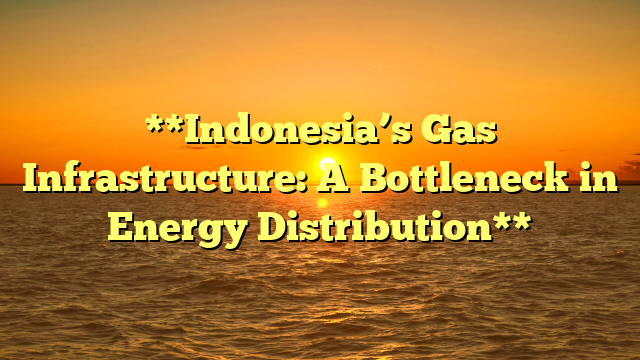
Indonesia, one of Southeast Asia’s largest natural gas producers, has long relied on its vast reserves to fuel economic growth and industrial development. However, despite its abundant resources, the country faces significant challenges in distributing gas efficiently to meet domestic demand. A lack of sufficient infrastructure—ranging from pipelines to processing facilities—has created bottlenecks in energy distribution, preventing many regions from accessing a stable and affordable gas supply. As energy demand rises and the global energy landscape shifts, Indonesia must urgently address these infrastructure challenges to ensure energy security and economic stability.
One of the primary issues in Indonesia’s gas infrastructure is the uneven distribution of pipelines across the archipelago. While gas-rich regions such as Kalimantan, Sumatra, and Papua produce substantial quantities of natural gas, much of the demand comes from densely populated areas like Java and Bali, where industrial activity is concentrated. The limited network of pipelines connecting production sites to consumption hubs forces the country to rely heavily on liquefied natural gas (LNG) transportation, which is more expensive and logistically challenging. This inefficiency results in higher gas prices for consumers and industries, making energy-intensive sectors less competitive in the global market.
Another major concern is the aging and inadequate capacity of existing gas processing and storage facilities. Many of Indonesia’s gas infrastructure projects were developed decades ago and have not been upgraded to keep pace with growing demand. This leads to inefficiencies in gas distribution, with frequent supply shortages in regions that lack sufficient storage capacity. Additionally, the outdated infrastructure increases the risk of technical failures, leaks, and environmental hazards, further complicating the country’s energy management.
The slow development of new gas infrastructure projects is also a bottleneck in energy distribution. Bureaucratic red tape, regulatory uncertainty, and lengthy approval processes have delayed critical pipeline expansions and LNG terminal projects. Investors, both domestic and foreign, often hesitate to commit to large-scale infrastructure developments due to concerns about government policies and return on investment. As a result, Indonesia struggles to attract the necessary funding and expertise to modernize its gas distribution network.
Furthermore, Indonesia’s geographical complexity adds another layer of difficulty to gas infrastructure development. With more than 17,000 islands, transporting gas across the country requires extensive investment in both onshore and offshore facilities. Unlike angsa4d with compact landmasses, Indonesia must build an extensive and interconnected network of pipelines, LNG terminals, and distribution hubs to ensure energy reaches all corners of the archipelago. The high costs associated with such projects have made it challenging to accelerate infrastructure development at the required pace.
To address these issues, Indonesia must prioritize large-scale investments in gas infrastructure. Expanding the national pipeline network, upgrading aging facilities, and streamlining regulatory processes are essential steps toward improving energy distribution efficiency. Public-private partnerships can play a crucial role in accelerating infrastructure projects by bringing in both capital and technical expertise. Additionally, the government must adopt policies that incentivize investment in gas transportation and storage, ensuring long-term energy security for the nation.
In conclusion, Indonesia’s gas infrastructure remains a significant bottleneck in energy distribution, limiting the country’s ability to fully utilize its natural gas resources. Without urgent improvements, energy shortages and price volatility will continue to pose challenges for industries and households alike. By addressing infrastructure gaps, Indonesia can enhance energy security, boost industrial competitiveness, and create a more resilient and efficient energy system for the future.





